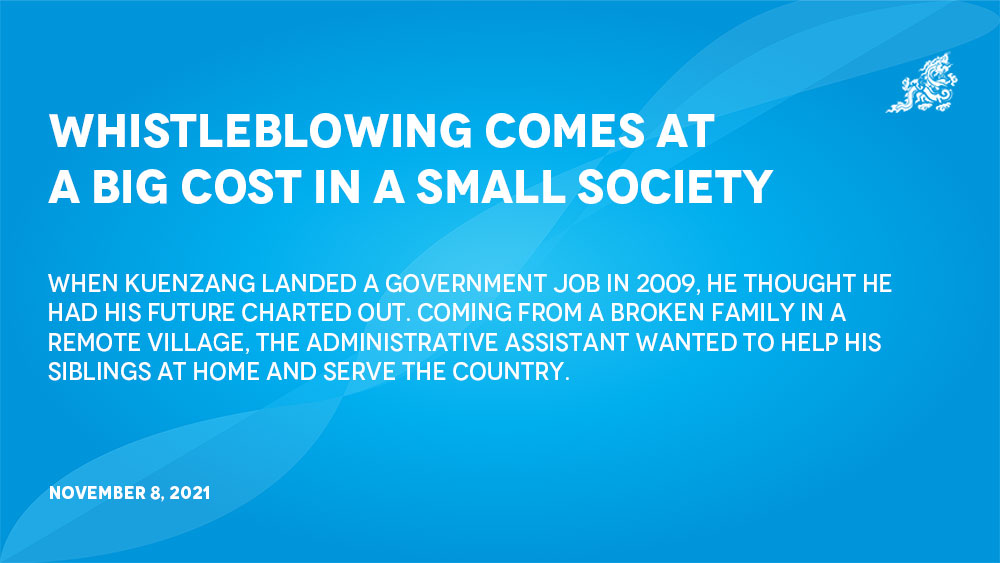Tashi Dema
When Kuenzang landed a government job in 2009, he thought he had his future charted out. Coming from a broken family in a remote village, the administrative assistant wanted to help his siblings at home and serve the country.
In the first two years of his service, he learnt a lot and enjoyed the work. In his third year, the head of the agency he worked for changed. The new “boss,” as he was called, was different. Running errands for his boss began to take up more time than Kuenzang’s official work.
“He misused his authority, awarded contracts to people he favoured, and misused government properties and funds,” Kuenzang said.
Kuenzang refused to be a bystander. He reported the matters to the ministry he worked for and the Anti-Corruption Commission (ACC).
His decision backfired.
The ministry sent internal auditors, but nothing came out of it. The ACC took almost a year to investigate. “Within that time, my boss targeted me. He even cancelled my study leave and tampered with my IWP ratings. I was accused of missing work and got issued a ‘last warning’ letter.”
Kuenzang was left to fight alone. He was transferred without any options. “The dzongdag and dzongrab at my new job were already convinced that I was a troublemaker,” he said. He was not assigned work for two months and was threatened with dismissal back to the ministry.
Five years after Kuenzang’s complaint, his boss was convicted to 41 years in prison for forgery, embezzlement, bribery, perjury, and official misconduct. “By then my life was already damaged,” he said.
Although laws and policies encourage people to report wrongdoing in public and private sectors, reporting them or whistle blowing has become a challenge without any protection. In a small society, fear of reprisals and a delayed response from agencies mandated to prevent corruption stop people from reporting corruption.
While whistleblowers face reprisals, there is apparent lack of action for those involved in corruption. Many people against whom there are audit issues are promoted and transferred.
Kuenzang is not the only person whose life has been impacted by reporting such issues.
A senior civil servant reported how the head of their agency was abusing his authority and involved in corrupt practices. He reported the matter to the Royal Audit Authority, the ACC, and the Royal Civil Service Commission.
When he lodged the complaint to the ACC, he specifically mentioned he had no protection, and before the agencies could address his complaints, his boss accused him of insubordination. He was issued a warning letter.
Disgruntled and unmotivated, the senior civil servant resigned. “I have left the system,” he said. “You can get the details of the case from my office. Reporting corruption is not easy and it comes at a huge cost.”
The office refused to share the details of the case.
Similarly, law enforcement agencies agree that there are no systems to protect witnesses to criminal cases.
A police source said that witnesses in sexual harassment cases refuse to come forward and share their stories, fearing their employers will mark them and derail their careers. “They also fear being judged by society.”
According to the source, there are incidents where some witnesses are forced by the accused and other superiors in the workplace to change their statements.
In a recent sexual harassment cases registered with the police, a witness, it was learnt, was intimidated to withdraw or change her statement. “Without protections, it is equally difficult for victims and witnesses,” the source said.
When the alleged sexual harassment case in the Bhutan Power Corporation (BPC) went viral, many in the office sought the person who had reported the matter to media, looking to retaliate in some way. An insider said that officials were concerned about who reported it to the media. “No one wants to find out the truth and stop such things from happening,” a support-level staff said.
Women were surprised when an officer questioned why the victim raised the issue when many women in the office had not reported it. “We learnt that the accused had done similar things to many women in the company, but no one has made an issue about it. I don’t understand the motive,” he said.
Another victim, who went to police to provide a statement that she had also been harassed by the accused, agreed many women had not reported their experiences.
She explained that after the accused touched her inappropriately, she did not know to whom she should submit a report. “There was no designated office to report it to. There is no contact person in the office. Sexual harassment is mentioned in the service rules, but there is no mechanism to address it.”
Providing evidence of sexual harassment is another hurdle that stops women from reporting. “People judge victims and make them feel guilty. When they do submit a report, the victim is always subject to victim-blaming,” she said. The employee discussed the issue with her mother. “Most Bhutanese women grew up accepting whatever men did, and changing that mentality is difficult. She thinks I will create more problems for myself by reporting the issue.”
With the recent cases, women feel that offices should have CCTV. “Reporting sexual harassment is difficult without evidence and providing evidence is not easy. Only CCTV in offices will help. It will not solve the problem, but at least it will deter such cases in offices.”


